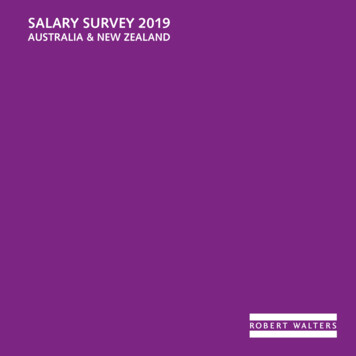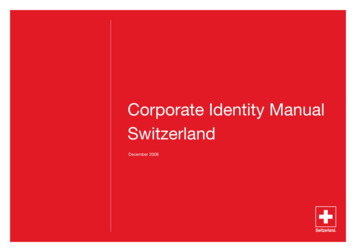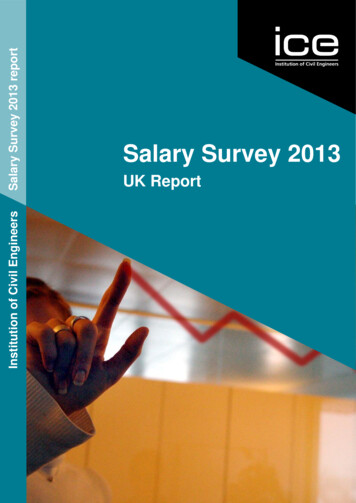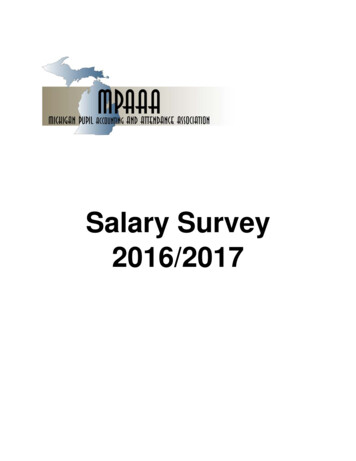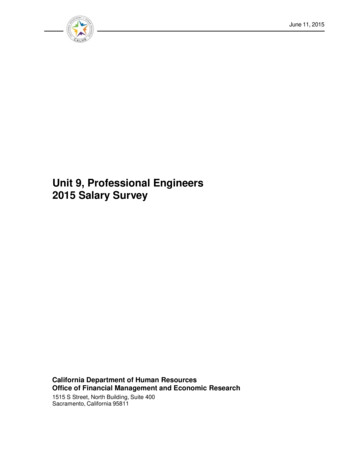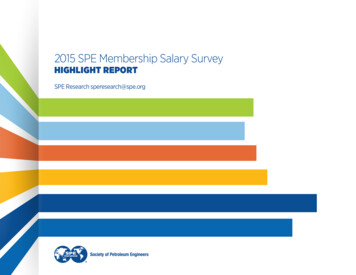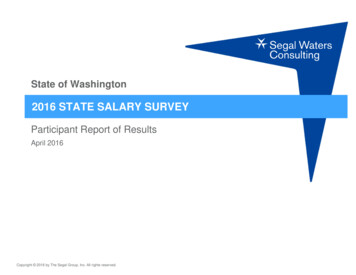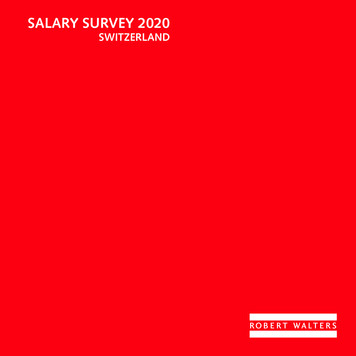
Transcription
SALARY SURVEY 2020SWITZERLAND
“WE ARE POWERINGPEOPLE ANDORGANISATIONS TOFULFIL THEIR UNIQUEPOTENTIAL.”
WELCOME TO ROBERT WALTERSSPECIALIST PROFESSIONAL RECRUITMENTSince opening our doors over 30 years ago, people have been at the heart ofeverything we do, from the jobseeker to the hiring manager and those who bringthem together. As a market-leading global recruitment group, we see our roleas that of a trusted advisor – helping our candidates and clients to build fulfillingcareers and grow effective teams both now and into the future.As we continue to grow internationally, we remain committed to our foundingprinciples: a strong team-based culture that puts clients and candidates first, apassion for quality in all that we do, a commitment to treating people with integrity,and an innovative spirit that propels us to constantly improve.These values lead us to prioritise building long-term relationships – we adviseand consult but never force people into making decisions that aren’t right for theirbusiness or career goals. We believe that our consultative approach sets us apartfrom the competition and continues to cement our reputation as a recruiter ofchoice, trusted by the world’s leading organisations and professionals.ROBERT WALTERS,CHIEF EXECUTIVE OFFICERIn addition, we are experts in the disciplines we recruit for, enabling us to provideour clients and candidates with quality insights into hiring and salary trends. Ourregional Salary Surveys are designed to help you make informed hiring decisionsand salary negotiations. If you would like to discuss these topics further, pleasedon’t hesitate to contact your local Robert Walters office listed in the back of thisbook.Robert WaltersCEORobert Walters Group69%OF OUR BUSINESSIS FOCUSED ONPERMANENTRECRUITMENT, 31%ON CONTRACT
GLOBAL REACH,LOCAL EXPERTISECountries we operate in31WE RECRUITACROSS LECHINACZECH REPUBLICFRANCEGERMANYHONG XICONETHERLANDSNEW ZEALANDPHILIPPINESPORTUGALSINGAPORESOUTH AFRICASOUTH KOREASPAINSWITZERLANDTAIWANTHAILANDUAEUKUSAVIETNAM
DOWNLOAD OUR SALARY SURVEY BOOKSTo discover hiring and salary trends across the world, read our Global Trends on page 10 or download our books covering: Australia & New Zealand Belgium & Luxembourg Netherlands United Kingdom Greater China & South East Asia France Portugal Middle East & Africa Japan Germany Spain Canada South Korea Ireland Switzerland Latin AmericaDownload your copy today by visiting www.robertwalters.com/salary-survey
OUR SERVICEIn an increasingly complex global recruitment market, theRobert Walters Group builds great teams for our clients byoffering an end-to-end recruitment service, on a local, regionalor global basis.OUR CORE DISCIPLINES INCLUDE: Banking & Finance Business Support Commerce Engineering & Construction Human Resources Legal Procurement & Supply Chain Sales & Marketing TechnologyWHAT MAKES US DIFFERENT?Bespoke, consultative service1. Commitment to qualityWe focus on building long-term, high-quality relationshipswith clients and candidates. We consult and advise, helpingour candidates make the right career move. This builds trustand loyalty and ensures we continually have the industry’stop talent for our clients.2. SpecialistsWe hire from industry to ensure our consultants arespecialists in the disciplines they recruit for. They alsobring with them strong personal relationships and industrynetworks, enabling them to find hard to reach talent withniche skill sets.
““Robert Walters is ourpreferred recruitmentpartner. They are ableto identify talent that wewould not have been ableto find or engage withourselves.Razmig Hovaghimian,Founder & CEO,Hoodline, USA”“Working with RobertWalters has been reallyseamless and rich, thanksto the insights that theconsultants bring in. I’veenjoyed my experienceworking with RobertWalters over the last 10years.Atul Gaur, HR Director,L’Oréal, Singapore andMalaysia3. No individual commissionWe operate a team-based profit-share system which, webelieve, sets us apart from the vast majority of ourcompetitors as it ensures the interests of both the client andcandidate remain our number one priority. There is also noownership of candidates, ensuring clients always see thebest talent we have available.4. Our people and cultureWe promote long-term, international careers, which helps us toretain our top people, providing continuity for our clients. We’reproud to say our senior management team is home-grown withan average tenure of 22 years.”Robert Walters has open,honest and experiencedconsultants. They offer abroad knowledge of themarket and have accessto an extensive network ofexperienced candidates.I’d recommend usingRobert Walters to anyprospective organisation.Shaq Mohajerani, Headof Development, HanwhaEnergy, Australia”5. Innovation cultureWe were the first recruiter to launch a recruitment processoutsourcing business and we continue to lead the way withan in-house innovation team which tests and trials the latestrecruitment technologies.6. Long-term business focusOur strategy is one of organic growth through internationalexpansion and discipline diversification. We invest in markets forthe long term and maintain our presence, even in tough times.7. End-to-end recruitment serviceWe offer clients a true end-to-end recruitment service, frompermanent, contract and interim recruitment through torecruitment process outsourcing.
CONTENTSINTRODUCTIONAbout the Salary Survey. 09Global Trends. 10REGIONAL OVERVIEWSAustralia & New Zealand. 14Greater China. 16Japan & South Korea. 18South East Asia. 20Europe. 22Middle East & Africa. 24US & Canada. 26Latin America. 28SWITZERLANDCOUNTRY OVERVIEW. 32Accounting & Finance. 34Banking & Financial Services. 36Legal. 38Sales & Marketing. 40Professional Services & Consulting. 42Technology. 44Procurement & Supply Chain. 46CONTACT US. 48
DOWNLOAD OURSALARY SURVEYSDOWNLOAD OUR SALARY SURVEY BOOKSDrawing on our local knowledge and expertise across six continents we’ve produced a series of books covering: Australia & New Zealand Netherlands Greater China & South East Asia Portugal Japan Spain South Korea Switzerland Belgium & Luxembourg United Kingdom France Middle East & Africa Germany Canada Ireland Latin AmericaDownload your copy today by visitingwww.robertwalters.com/salary-survey
WELCOME TO THE 21STEDITION OF THE GLOBALSALARY SURVEY PROVIDINGCREDIBLE INSIGHT INTOHIRING AND SALARY TRENDSWORLDWIDE.8Robert Walters Salary Survey 2020
ABOUT THESALARY SURVEYWelcome to the 21st edition of theannual Robert Walters Salary Survey.As the first recruitment company toproduce a comprehensive overviewof global salaries and recruitmenttrends across the world, we arepleased to share the latest editionwith you.Our Salary Survey is based onthe analysis of permanent, interimand contract placements madeacross each of our geographies andrecruitment disciplines during 2019,and our predictions for the yearahead.GET IN TOUCHIf you would like to find out moreabout salaries and recruitmenttrends in your industry, call one ofour specialist consultants today.Contact details can be found at theback of this book.ABOUT THE SALARY SURVEY9
GLOBAL TRENDSGLOBAL OVERVIEWOverall the global hiring market wasactive in 2019 despite widespreadeconomic and political uncertainty.Demand for specialist technologyskill sets as well as risk, regulatoryand compliance professionals led tocandidate shortages in many markets.Across Europe, we saw demand fortalent outstripping supply as businessescontinued to hire. In France, therecruitment market performed well in2019 despite employers pausing hiringactivity during times of difficulty such asthe yellow vests (gilets jaunes) protests.Belgium experienced strong economicgrowth in 2019, which led to anactive hiring market and widespreadtalent shortages. Across the borderin Germany, hiring was buoyant astraditional Mittelstand companiesfocused on digitalisation and foreigncompanies grew their presence.Similarly, in the Netherlands, a strongeconomy and an exceptionally lowunemployment rate led to candidateshortages across all disciplines.In Spain, hiring activity was high in thefirst half of 2019 but reduced in the10Robert Walters Salary Survey 2020second half due to uncertainty causedby the US-China trade war, Brexitand the difficulty of building a stablegovernment in Spain.moving specific aspects of productionout of Mainland China to locations suchas Taiwan and South East Asia, whichimpacted hiring.Brexit continued to dominate theheadlines in the UK, impacting hiringin many sectors; however, therewere pockets of hiring activity acrosstechnology, fintech, property andprofessional services.South East Asia experienced apredominantly buoyant hiring marketin 2019, particularly in the high-growthmarkets of Indonesia, the Philippines,Thailand and Vietnam. Demand for‘glocal’ talent – professionals with astrong understanding of both globalbusiness practices and local culturalmindsets – continued as morebusinesses internationalised.In the Middle East, recruitmentactivity was high for most of 2019.Nationalisation remains a key priority inthe UAE and Saudi Arabia, leading tolocal talent shortages, wage inflationand nationals moving roles morefrequently. We saw similar trends acrossAfrica as companies sought to adhereto government nationalisation policies.Throughout Greater China, the localmarket outlook became increasinglyuncertain in the latter half of 2019,with the US-China trade war weighingheavily on sentiment. Candidatesbecame harder to source asprofessionals proved reluctant tochange roles in uncertain marketconditions. We also saw manufacturerstaking action to avoid US tariffs byIn Japan, acute talent shortagescontinued due to the nation’s decliningand ageing population as well as highdemand for bilingual professionals withinternational expertise. Companiesspecialising in cloud computing, AI,“As top talent prioritisekeeping their skills upto date, we recommendemployers offer clearlearning and developmentopportunities to attractin-demand professionals.”
future mobility and smart factoriesincreased hiring in 2019 in preparationfor the rollout of 5G in 2020.In Australia and New Zealand, theeconomic environment looks set toprevent any widespread jobs and salarygrowth in the near to mid-future. Theexceptions will be in sectors wheredemand outstrips supply – mostnotably in technology, financial servicesand infrastructure.KEY TRENDSAcute tech talent shortagesAcross most markets the demand fortechnology professionals with specialistskill sets will continue to outstripsupply in 2020. Digital transformationsare continuing apace across manyindustries in China, Hong Kong,Australia and New Zealand, so in 2020we expect to see employers vyingfor professionals with expertise in AI,big data, UX, development and cybersecurity.these skill sets within the bankingand financial services sector asbusinesses sought to adhere to newregulations and guidelines set by theircentral banks. Japan continued tostrengthen its financial regulationsand companies faced greater scrutinyover their handling of personal data,leading to high demand for audit, riskand compliance professionals. In theNetherlands, salaries for compliance,regulatory reporting and riskmanagement specialists are expectedto rise in 2020 due to extreme talentshortages.“Advice to employersIn order to secure top talent withspecialist skill sets we recommendemployers run swift and efficientrecruitment processes, ensuring offersare made in a timely manner. As indemand professionals consider movingroles they will focus on more than thesalary on offer – they are keenly awareof the need to keep their specialistskills up to date, so we recommendbusinesses offer clear learning anddevelopment opportunities to attractthe best talent on the market.IN 2020 WE EXPECTTO SEE EMPLOYERSVYING FOR TALENTWITH EXPERTISE IN AI,BIG DATA, UX,DEVELOPMENT ANDCYBER SECURITY.Digital experts, data scientists andcyber security specialists will also be inhigh demand across Brazil, Chile andMexico as companies migrate theirbusinesses online and deal with theextra security challenges this presents.In San Francisco, companies willstruggle to hire software and machinelearning engineering specialists due to ashortage of qualified professionals.Demand for risk and complianceskill setsAs regulatory requirements evolvealongside digitalisation, companies areseeking professionals with expertisein risk, compliance and audit. SouthEast Asia saw strong demand n2019inpreparationfortherolloutof5Gin2020. 11
REGIONAL TRENDSWith our presence spanning 31 countries across six continents ourspecialist teams offer in-depth knowledge of the sectors they recruit for.In this section our regional managing directors share their insights onhiring and salary trends in 2019 and their predictions for the year ahead.Our regional overviews include: Australia & New ZealandGreater ChinaJapan & South KoreaSouth East AsiaEuropeMiddle East & AfricaUS & CanadaLatin America
THE GROUP’S INTERNATIONAL NETWORKOF OFFICES SPANS 31 COUNTRIES AND SIXCONTINENTS ENABLING US TO MEET THEDEMANDS OF CLIENTS AND CANDIDATESWHOSE NEEDS EXTEND BEYOND LOCALMARKETS
AUSTRALIA & NEW ZEALANDINTRODUCTIONThe prevailing global and localeconomic headwinds look set toprevent any widespread jobs and salarygrowth in the near to mid future. Thatsaid, in the Australia and New Zealandmarkets, 2020 offers some reasons forcautious optimism, as we anticipatesalary growth in selected sectors wherethere is high demand and limited supply— most notably in technology, financialservices and infrastructure.BRIGHT FUTURE FOR TECHSPECIALISTSTechnology transformations arecontinuing unabated across everyindustry in Australia and New Zealand.As a result, 2020 will see employersvying for professionals with expertise indevelopment, UX, data management14Robert Walters Salary Survey 2020and cyber security. For professionalswith these more niche skill sets, weanticipate further salary increases andpremium rates for contractors.Concerns about widespreadunemployment due to automation andartificial intelligence have, so far, provedunfounded. In 2020, we expect sometransactional roles to become obsolete,but new technology jobs will be createdin areas such as design, programmingand analysis.REPAIR JOBS AT THE BANKSIn the wake of Australia’s recent RoyalCommission, financial institutionsare under enormous pressure fromregulators, legislators, government,media and their customers. The resultis an unprecedented focus on risk,Our presence in Australia &New Zealand: urnePerthSydneyWellingtonremediation and compliance projectsacross the banking, financial servicesand insurance sectors — on bothsides of the Tasman. Experiencedprofessionals who can deliver these
massive programs are relatively scarce,and so demand (and salaries) are likelyto remain high.CAUTIOUS GROWTH ININFRASTRUCTUREAustralia and New Zealand will remaincommitted to long-term nation-buildingprograms throughout 2020. Investmentin traditional infrastructure projectssuch as transport, health and educationwill continue to stimulate demand forcivil engineers and project managers,as well as professionals in ancillarysectors. And while the emergingrenewables sector is showing signsof promise, and the creation of somenew jobs, uncertainty may linger untilthe Australian Government articulates amore comprehensive energy policy.ADVICE FOR EMPLOYERSWhere skills shortages exist, hiringmanagers have much to do in 2020.Money talks, of course, but highsalaries and premium rates may notbe enough to entice specialists tojoin your organisation. Apart fromflexible working, which remains a highpriority for many, professionals areacutely aware of the need to keeptheir specialist skills up-to-date, soemployers who can offer cutting-edgeprojects and substantial personaldevelopment opportunities will be thosewho attract and retain the best talent.helping to ease the disconnect betweenskills that the next generation of talentare being taught and what businessesneed.In 2020, we anticipate salarygrowth in selected sectorsof high demand and limitedsupply, most notably intechnology, financial servicesand infrastructure.ADVICE FOR CANDIDATES2020 will be a year of opportunityfor professionals with skills in theaforementioned areas of high demandand short supply. Approaches andoffers from prospective employers arelikely to be common, but our adviceto these individuals is that not everyjob is equal. Do your research aboutpossible employers, know what yourmarket value is, and remember that ina fast-moving jobs market this goldenmoment may not last long. In 2020, werecommend that in-demand specialistsseize the day.POLITICAL LANDSCAPE IN 2020While the outcome of New Zealand’s2020 general election currently appearstoo close to call, we can predict twopossible knock-on effects. First, manyemployers are likely to wait until afterthe election before embarking uponany major hiring campaigns. Second,the jobs market in Wellington will bedominated by contract and contingentroles until after the election result isknown.In Australia, 2020 will see local electionsin Queensland and the AustralianCapital Territory. Enterprise employersin these states may see elections asan opportunity to gain an advantageover their competitors. Aggressivehiring campaigns in areas of skillsshortages during election season couldyield a windfall of talent, as many otheremployers may have scaled down theirrecruitment activity.Both the Australian and New Zealandgovernments are currently tighteningimmigration restrictions. For manyemployers, this means that their bestchance of hiring overseas talent in2020 will be to work with a recruitmentpartner who can offer access to aninternational talent network as wellas expert, up-to-the-minute skilledmigration advice and support.‘Potential’ should be the watchwordfor many employers in 2020. Duringselection processes, employers shouldremain open-minded when candidatesare a good cultural fit but short ontechnical experience. A comprehensivelearning and development strategy canhelp plug technical gaps, whilst also 15
GREATER CHINAGREATER CHINAThe global economy and local marketoutlook became increasingly uncertainin the second half of 2019, with theimpact of the US-China trade warcontinuing to weigh on sentiment,particularly in Hong Kong and MainlandChina.Despite the risks, we saw demand forcandidates in key growth areas. Thetechnology industry was one of thefastest-growing markets across GreaterChina and, because of the innovativeand highly skilled nature of the industry,there was an ongoing shortage ofsuitably qualified candidates. Employersfound talent harder to source, asprofessionals were reluctant to switchroles because of the uncertainty causedby changing market conditions.16Robert Walters Salary Survey 2020MAINLAND CHINAThe impact of lingering economic tradefrictions and market uncertainties putpressure on the job market in 2019.The slowdown in hiring was moreapparent in the manufacturing sectorwhere companies are trying to avoidtariffs by moving specific aspects ofproduction out of Mainland China.Organisations in the region took stepsto adapt by adding value to theirexisting products and consideringexpansion into international marketsthrough free trade zones and the Beltand Road initiative. This drove demandfor candidates with strong technicalskills, solid business developmentcapabilities and international workexperience. Despite relatively slowergrowth, the country continues tostrengthen its digital transformationOur presence in Greater China: BeijingShanghaiSuzhouSouthern ChinaHong KongTaipeicapabilities, through initiatives such asthe development of Shenzhen as a hitech model city. Technology will remaina growth sector with employers lookingto secure experienced professionals inR&D, big data and artificial intelligence.In 2020, we expect both candidatesand hiring managers to remain cautiousdue to uncertain market conditions.
While the total number of jobs maydecline, demand is expected tocontinue for highly skilled professionals.HONG KONGWith ongoing political and economicuncertainty, Hong Kong has faced achallenging period in 2019, from tradeand tourism to consumer sentimentand capital markets. Nevertheless, itretains its appeal to companies as aglobal business and finance hub.In 2019, financial services firms took arelatively cautious approach to hiring,with the exception of virtual bankingand fintech. With the issue of eightvirtual banking licences, the demandfor specialists ranging from C-levelto managers has been on the rise inall areas of finance, legal, technologyand risk and compliance, as well asoperational and HR roles. This has beenthe backbone of financial services hiringover the last 12 months and we expectto see strong growth in this area in 2020.Organisations across a range ofdifferent industries will continue theirdigital transformations, leading tosustained demand for analytics, bigdata, DevOps and digital specialists.At the same time, we have seen anoticeable shift towards contract hiringas businesses looked to build an agileworkforce that can adapt to the fluideconomic conditions. We expect thistrend to continue in 2020.Towards the second half of the year,export-oriented companies becamemore conservative in their operationsdue to the US-China trade war. Wesaw manufacturers and electronicscompanies reshoring some productionThere is an atmosphere ofcautiousness across theregion and the outcome ofthe US-China trade war willplay a determining role inthe market and employmentconditions in 2020.lines from Mainland China to otherregions in Asia, including Taiwan. Theinflow of investment has driven demandfor technology and software talent.At the same time, there is continuousdemand for engineering specialistswithin renewable energy industries.Compensation is expected to besteady, with levels set on a case-bycase basis, depending on individuals’expertise and performance.OUTLOOK FOR 2020Demand for specialists is likelyto continue in 2020, despite theuncertain economic situation.With skills shortages likely to beexacerbated, companies are expectedto place greater emphasis on retentionstrategies. Moderate salary rises areanticipated across Greater China, andcompanies are advised to promoteclear career development and smartworkplace policies like flexible working,which are increasingly valued byemployees.Candidates looking for a new roleshould embrace digitalisation andinnovation to ensure they remaincurrent and relevant in a changingjob market. In-demand professionsand specialist roles will continue tocommand premiums and yield lucrativenew opportunities, but general salaryinflation will be subject to, and definedby, the outcome of the variablemacroeconomic conditions.TAIWANTaiwan started 2019 with better-thanexpected economic growth, resultingin buoyant hiring levels across severalindustries, including technology, FMCGand healthcare. 17
JAPAN & SOUTH KOREAJAPANDespite global economic andgeopolitical uncertainty, demand fortalent far outstripped supply in 2019with a job openings-to-applicants ratioof 1.6 to 1. Japan’s labour shortagescontinued unabated due to its decliningand ageing population, as well asincreased demand for talent withEnglish-language skills and internationalexpertise. Both foreign-affiliated firmsand Japanese companies operatinginternationally are driving this demandfor bilingual talent with internationalor global business exposure. Otherbusinesses operating locally, such astransport networks, retailers, hotels andservice and entertainment companies,are beginning to follow suit.Companies specialising in cloudcomputing, artificial intelligence (AI),18Robert Walters Salary Survey 2020mobility (connected cars andautonomous driving), smart factoriesand medtech increased hiring in 2019 inpreparation for the rollout of 5G in 2020.In addition, the digital sector has seenstrong growth in smartphone paymentservices, with many new offeringslaunching in quick succession. As aresult, talented individuals have flockedto the industry, including candidates withfinancial backgrounds, app developers,security experts and other professionalsable to draw from a diverse range ofexperience and skills.The medical industry continues to hirein order to keep pace with Japan’sageing population, with life sciencesspecialists in particularly high demand.Medical device firms and pharmaceuticalcompanies are searching forprofessionals specialisingOur presence in Japan & SouthKorea: OsakaSeoulTokyoin central nervous system disorders, andoncology and regenerative medicine.Following Japan’s interest in the 100year lifespan concept, which focuses onpositive longevity, hiring has increased atmanufacturers producing ingredients fordietary supplements and organic foodproducts.In 2019, Japan continued to strengthenits financial regulations followingseveral high-profile incidents involving
cryptocurrencies and smartphonepayment fraud. Similarly, companiesare under increased scrutiny regardingtheir collection and usage of personaldata, which requires compliance withthe Personal Information Protection Law.Both these things have led to increaseddemand for cyber security, audit, riskand compliance professionals.In 2020, legislation designed to ensureequal pay for equal work will comeinto force. This will give those in parttime and temporary work more stableemployment conditions, an uplift inwages and an increase in opportunitiesto receive full-time employment. Onthe employer side, we expect to seecompanies utilising contractors evenmore as they seek to secure specialisedtalent at short notice in order to launchnew projects or move into new markets.SOUTH KOREAWith the implementation of the52-hour workweek, another rise in theminimum wage and prolongedUS-China trade tensions, foreign directinvestment (FDI) in Korea declinedin the first half of 2019 compared to2018. Despite this, FDI in the first halfof 2019 actually surpassed the 10-yearaverage, indicating that general upwardmovement continues.high-growth field remaining strong.In addition, the rapid growth of thebiotechnology industry has expandedthe market for analytical devices anddiagnostics, leading to increased hiringin these areas.Both foreign-affiliatedfirms and Japanesecompanies operatinginternationally are drivingdemand for bilingualtalent with overseasexperience.Competition for technology specialistscontinued to intensify with thedevelopment of new business modelsconverging IT and healthcare, as wellas across-the-board digitalisation ofmany industries including retail, logistics,manufacturing and finance. Demand fornew technology skills remains strongin the manufacturing sector, where atransition to smart factories is takingplace as part of the Fourth IndustrialRevolution. Whereas manufacturers ofinternal-combustion engine vehiclesexperienced a decline against abackdrop of poor business performancein South Korea, the autonomousand electric car industries continuedto boom. With that, the demand forbilingual data scientists, deep learningengineers and autonomous systemplatform specialists in the manufacturingfield will continue in 2020.Turning to new and renewableenergy, the Korean government hasannounced the ‘Renewable Energy3020 Implementation Plan’, with thegoal of producing 20% of the country’senergy from renewable sources by2030. With the accelerated introductionof infrastructure for solar, wind andhydroelectric power generation, thedemand for top talent in these areas isgrowing steadily.In 2019, the Korean governmentinvested heavily in the biotechnologysector, along with future mobility(autonomous and electric vehicles) andrenewable energy, to lead the country’seconomic growth into the future. Asa result, the biotechnology industrydrew exceptional attention from foreigninvestors in 2019, with demand forhighly skilled talent in this potentially 19
SOUTH EAST ASIAA SOLID GROWTHTRAJECTORYIn 2019, hiring activity in South EastAsia was predominantly buoyant,particularly in the high-growth marketsof Indonesia, the Philippines, Thailandand Vietnam. Elections in the first halfof the year saw businesses take a moreconservative approach to hiring, butactivity recovered in the latter half of2019. In Malaysia and Singapore, hiringshowed steady signs of growth, withrobust activity in technology.Across the region, technology andtransformation remains a major focusfor businesses, which is in turn shapinghiring trends.20Robert Walters Salary Survey 2020KEY HIRING TRENDSHybrid skill sets sought afterAs companies continue theirdigitalisation journeys, hiring managersare looking for experienced technologyprofessionals with hybrid skill sets.Specifically, they are seeking midlevel and senior managers who canhelp their teams navigate change andensure the successful adoption of newtechnologies.Outside of the technology function,employers are seeking professionalswith the ability to leverage newtechnology within their work to drivethe business forward. For example,HR professionals who are well-versedin workforce analytics and financeprofessionals with expertise in businessintelligence are increasingly in demand.Our presence in Sout
10 Robert Walters Salary Survey 2020 GLOBAL TRENDS GLOBAL OVERVIEW Overall the global hiring market was active in 2019 despite widespread economic and political uncertainty. Demand for specialist technology skill sets as well as risk, regulatory and compliance professionals led to
